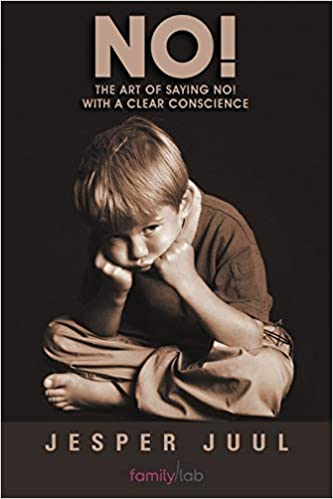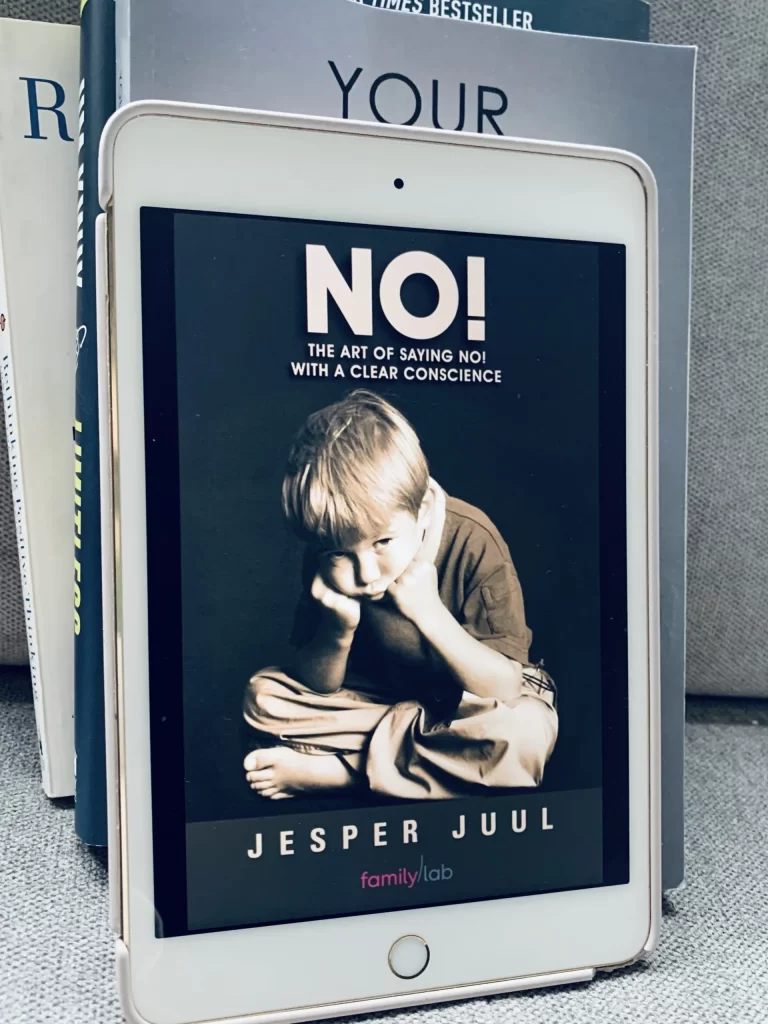 No! – Book summary
No! – Book summary
The Art of Saying No! with a Clear Conscience
Jesper Juul
AuthorHouseUK (25 July 2012)
About the author:
Jesper Juul was a family therapist, husband, father and grandfather. He is the author of numerous books and a renowned international public speaker. He has founded Familylab International – an organisation committed to inspire parents to find new and healthier ways to become a successful family and professionals to create more profound relationships with children and youth in their care.
About the book:
In this book, Jesper Juul teaches us how to set limits with children. He explains why it is only possible to say “Yes!” to yourself when you also feel liberated and free to say “No!” to others. By letting go of the obligation to be nice and the need to serve and please others, it is easier to connect with your true identity. It is a super quick reading, and the lessons from this book are not only relevant for the parent-child relationship but for all relationships we have.
Key ideas from the book:
In order to say “Yes!” to ourselves, we need to learn to say “No!” to others
“This book is not designed to support those parents who see a need to set fixed limits and strict boundaries for their children. WE do not want to support anyone’s desire to control or gain power over others – children or adults.
On the contrary, this book is all about the quality of our relationships and how important it is that we are able to say “No!” to others, as this is the only way we are able to say “Yes!” to ourselves. We need to learn to define our own personal boundaries – and as part of that process, define ourselves. This is as important for our own lives as it is for the relationships and communities we are part of. We can do this with a very clear conscience for the simple reason that we will provide a good role model for our children.”
We’ve picked this book after reading Your Competent Child, and here Juul continues the topic on how to set boundaries with children (and with other people in general) to support their healthy development. It is a very quick reading (the book is only 100 pages) but encourages reflection. ☺
Setting borders for our children is not about controlling them or gaining power over them, but instead, it is about being authentic, taking responsibility for ourselves and learning how to define our own boundaries when interacting with others.
Here are two important moments. Firstly, when we are in loving relationships, we are more likely to become vulnerable and “happily and willingly cross our usual boundaries in exchange for the joy of sharing and being together”. Secondly, considering historical, cultural and socio-economic reasons, it is really hard for parents to say “No!” to their children. So all of this is a common source of frustration for parents and children, which may have loads of negative consequences.
But by saying “No!” to others, we learn how to say “Yes!” to ourselves:
“No!” requires careful consideration, deep engagement, bold courage and absolute honesty. Precisely because of this, it is the most difficult answer. It is also the most loving answer.”
Here is the point. To say “YES!” to ourselves, we need to spend time reflecting on what is important for us and how we can achieve it. Once we know where we are heading, it is easier to navigate and say “NO!” to everything that takes us off the course. For example: if you decided to follow a healthier diet at home, ordering fast food is not the option, but cooking a meal is. By saying “NO!” to your children’s cravings (and yours as well), you stand for what you authentically believe. It is not easy but crucial in any relationship.
Love vs Service
“We all know that leadership is not about bossing others around and getting things the way we want them. It is all about representing some ideals and goals. When this is done with enough integrity, others want to co-operate.”
Juul makes an important point: for healthy development, children need parents who are leaders (give them respect, trust and gentle guidance) and not bosses or servants.
Get this: when parents behave as servants, they often forget about their own needs and constantly worry on behalf of their children. Small children have this amazing ability to “tune in to” their parents’ feelings and emotions, so parents’ insecurities reflect on their behaviour. Kids start perceiving adults as service providers and eventually demand more and more, without realising that they are real people with feelings, emotions, needs and boundaries. And that causes loads of issues. So right from the time when a baby starts actively exploring the world and people around, it is a crucial time to show them that parents are people who are “much more than service providers”. Basically, parents need to teach their kids that love is not the same as service.
Love is about the ability to set and respect each other’s boundaries.
“Children operate as researchers, not as students. They have to experiment to be able to reach their own conclusions. All they really need from their parents is trust and gentle guidance.”
Having children is, in many ways, a self-centred project. It is often based on our desire to be able to give, love and care for others. Basically, to serve. But in fact, we should remember to balance these self-centred desires with openness towards our children’s personalities and needs.
Be authentic – personal messages and self-esteem
“When we use this kind of “child friendly” language, we weaken the message, and we fall short of making the right impression. Our emotions are no longer connected to the words we use. This makes it difficult for us to communicate who we are as people. This communication ignores important messages about our boundaries, desires, needs and what is important for us.”
Effective communication with kids is an art. So if you feel like your children don’t listen to you, that most likely mean that you don’t make it personal – Juul recommends using personal language and linking your words to your emotions. Communication becomes more effective when you express yourself authentically – that’s not about “speaking nicely but about sending a personal message”. Well, that doesn’t mean that you have to scream at your kids when you are annoyed to express yourself, but using an irritated tone is not an issue.
For example, it’s hard for kids to decode the message said in a blaming tone: “Mommy gets really frustrated when you don’t clean up after yourself”. Their brains don’t process the information that way, and they can’t understand what you actually want them to do and why. But if you say in a clearly irritated tone: “I want you to clean up now!”, they are most likely to hear you and do what you’ve asked them to do.
Basically, scientists believe that what we say is just 7% of our communication. The rest 93% of communication is non-verbal. That means that HOW you try to convey your message to your child is really important. We often wrap up our personal messages in words, and kids just don’t want to unwrap them.
For example, when we try to cover our anger with a teacher-like tone (“nice way”), children just don’t get it. They see that you say one thing, but your tone of voice conveys something different.
The whole point is to match your words with your feelings to make communication personal and effective. Jull also adds:
“The language of love is neither positive or negative – it is personal.”
Juul says that when we express ourselves on a personal level, we can truly establish a connection with others. Our personal language may make others sometimes feel surprised, frustrated or angry, but the main point is that in that way, you would not push their boundaries or offend their personal integrity. And that means you would not harm their self-esteem in that way:
“The better you are able to connect what you say with who you are, the more your self-esteem will grow, and you will gain respect and understanding from others.”
Direct language helps you establish leadership and personal boundaries so your kids know what you stand for. Juul also shares great wisdom:
“Life within the family is not about who wins. It is about ensuring that everyone gets as much as possible of what they need, and as little as possible of what might hurt them.”
That is brilliant! Absolutely love it!
Needs vs wants
“Obviously, the most important duty of any parent is to fulfil their children’s fundamental needs for belonging, closeness, safety, food, care, clothes, warmth and rest. In addition to that, you might have the option of also giving them some of what they want.
They do not have an imminent knowledge of the difference between that they need and the thing they want. The poverty of previous generations and their authoritarian ways of ruling the family resulted in children’s longing for freedom – a freedom to do and have exactly what they wanted. These children have now become parents, and the desire for freedom is still deeply ingrained in us and is, in fact, one of the reasons why we for many years have had a tendency to provide this freedom and let the family budget be ruled by our children’s wants.
We can spoil children by giving them too much of the things they want. Spoilt children will not take a “No!” for an answer. They always expect to get what they want which makes them demanding and annoying. Children only develop this way because they got too much of the wrong things – and most importantly – for the wrong reasons.”
We want the best for our kids. We want to give them all that we didn’t have in our childhood. And on top of it, our consumerist society offers so many opportunities! But then we end up spoiling our children and actually hurting them in the long run (their sense of empathy and ability to interact socially will suffer).
So Juul brings to our attention one point to reflect on: there is a big difference between WANTS and NEEDS, and parents’ goal is to teach them the difference. That’s where a confrontation between parents and kids often happen. For example, a conflict may arise between parents’ values and child’s wish, or parents’ budget and child’s desire.
For example, kids don’t need an endless amount of toys; they need something to play with. Or they may want to have a pizza and cola for dinner (and chocolate ice cream for a dessert), but in fact, they need nourishing food. Of course, there is no harm in giving kids what they want. But we shouldn’t do it to avoid conflicts, gain popularity or suppress their needs and desires.
Juul’s philosophy is that we always have to take our children and their wants and needs seriously. So during the first ten years, parents can use their authority based on their own values to make decisions about saying “No!” and “Yes!” to child’s wants. But we always need to engage in an open dialogue with them without criticism. It is especially important when a child grows older. Older kids would also have to learn the difference between their likes and dislikes so that they could make the right decisions by themselves:
“The practice of carrying out an inner dialogue between their likes and dislikes gets to the heart of the matter of both children’s and adults’ self-esteem. Ultimately, it is all about their ability to define their own boundaries in relation to other people, peer pressure, threats and promises.”
Here also comes to mind Walter Mischel and his Marshmallow test. When you think of it, our WANTS are about immediate gratification, and NEEDS are more about delayed gratification. So guess what predicts success in life? Our ability to delay gratification! That means that when we teach our kids to manage wants and needs from early childhood, we also help them develop self-control.
When to say “No!”
“You need to consider your own values, needs and personal boundaries, and relate this to the consequences your “No!” might have on the child’s life. From as early as age two or three, you are able to include their thoughts, experiences, fears and expectations in your considerations. This does not mean that they are able to make decisions to the same extent as you but it does mean that they have a right to be heard and taken seriously. Their contribution will often be both surprising and valuable. Involving them is an invaluable way for you to stay up to date with their concept of self, their boundaries and desires. Children are not particularly adept at talking about their emotions, nevertheless, when they are given the opportunity to talk about what is in their minds, they are surprisingly good at expressing themselves.”
Again, take your children seriously. When they hear your “No!” they might feel frustrated, sad or disappointed, but you should never criticise, use irony or ridicule their emotional reaction. So next time your child throws a tantrum in a toy shop because you said “No!” to buying another Spiderman, say, “I can see this made you feel really disappointed. I hope you feel better soon.”
When we say “No!” to a child, we should be open to negotiation, but we absolutely must be true to our values and be ready to connect them with our decisions and actions.
Although we can say “No!” to pretty much whatever we like (or dislike), Juul warns us that we should never say “No!” to fulfilling our child’s fundamental needs for belonging, closeness, safety, food, care, clothes, warmth and sleep.
What is also important for parents is to be open-minded when children say “No!” to us:
“When their “No!” is met with criticism, persuasion, motivation, threats or promises, both of you will instantly lose dignity. If you instead were to repeat your request and then give the child some time (often just a few minutes), they will automatically convert their resistance to co-operation. They will be able to say “Yes!” with their personal integrity intact as supposed to blindly following your orders.”
Juul highlights it in all of his books – we should treat each other with dignity and respect. This will help us deeply connect with each other and establish trust (which is really important for teenagers).
The male and female “No!”
“The male “No!” – or the definitive “No!” does not belong to men and fathers only. There are plenty of mothers who learn to master it too. It is difficult to define the difference between the genders. Perhaps part of the explanation simply lies in the fact that historically women have had limited opportunities to say “Yes!” to themselves, compared to men who have been able to do what they wanted – at least within the family environment.
Nevertheless, it is certain that many mothers (and their children) would benefit from letting go of their sense of guilt and negative conscience. Guilt and negativity send a vague message and force children into constant confrontations simply because they have not been given clear messages.”
Men are better at setting personal borders with children and their partner just because, historically, they had fewer responsibilities at home. Here is the logic: 1) women feel fully responsible for the family well-being, 2) they stop caring for themselves (or almost stop) and devote themselves to their children (and maybe partner as well ☺), 3) whenever they say “Yes!” to themselves a sense of guilt comes up (how dare am I going for a run instead of reading a book to my child!), 4) kids sense these negative feelings, become confused and keep crossing mom’s personal borders, 5) everyone is stressed and unhappy.
So here is an important message for both moms and dads: “Happy wife – happy life”. The whole family benefits when a mom can say “Yes!” to herself more often:
“Many women would benefit from active support, more inspiration and positive help to take better care of themselves. It would indeed benefit the whole family, but it is easier to sit back and be critical.”
So, ladies, family experts are on your side – don’t feel guilty saying “Yes!” to yourself. Think about what makes you happy, what’s your number one self-care habit and carve out some time for it regularly.
Action steps for you:
- Practice personal messaging (personal language) when communicating with kids: I want; I like.
- Teach your child about the difference between needs and wants.
- Say “Yes!” to yourself more often and set healthy boundaries.
Favourite quotes from the book:







